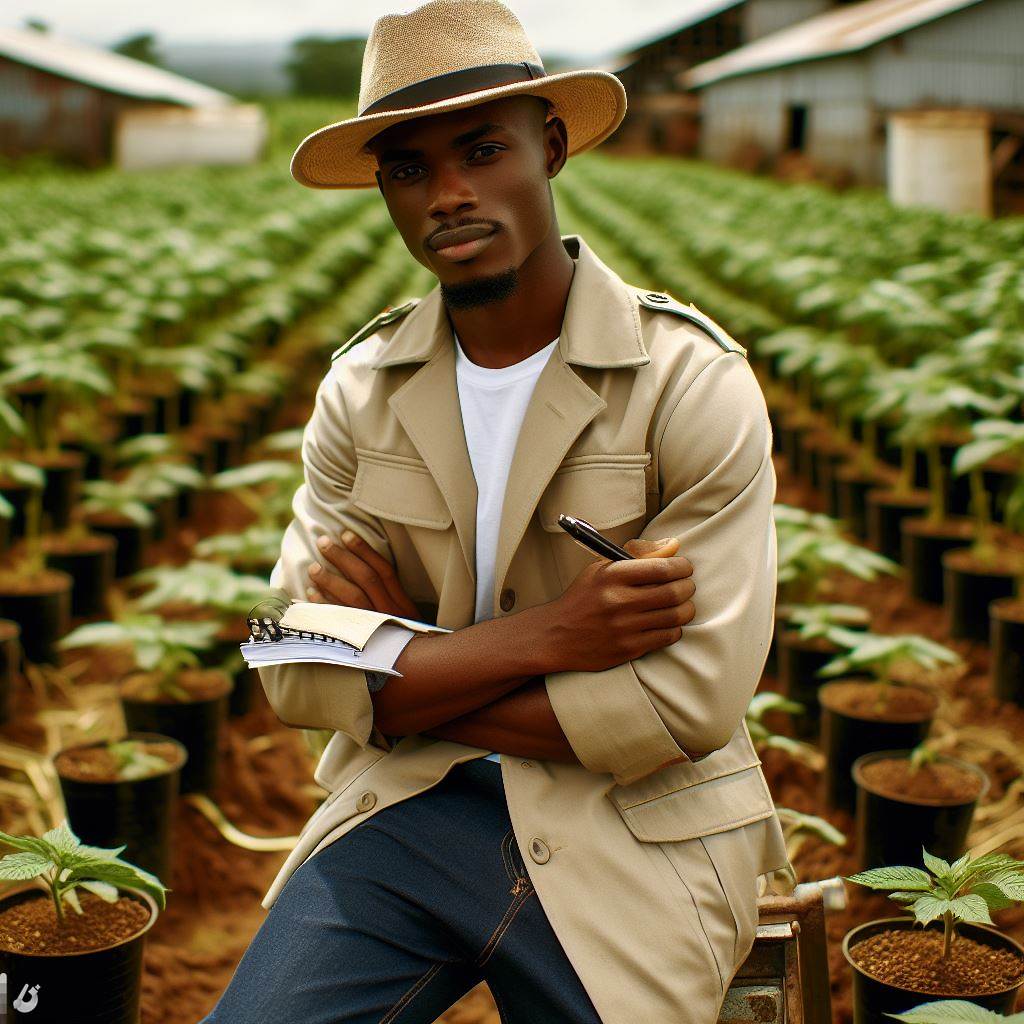Introduction
Importance of Agriculture in Nigerian Universities
Agriculture is a cornerstone in Nigerian universities, shaping the nation’s food security and economic stability.
It serves as a crucial discipline, fostering sustainable farming practices and innovative agribusiness models.
Nigerian universities emphasize agriculture studies due to its pivotal role in national development.
The agricultural sector employs a significant portion of the Nigerian workforce, contributing substantially to the economy.
Purpose of the Blog Post
This blog delves into the contrasting domains of Crop Science and Agronomy in Nigerian universities.
We aim to dissect the nuances between Crop Science and Agronomy programs, highlighting their distinctions.
Exploring curriculum variances, career prospects, and societal impact will be pivotal in this discussion.
Our goal is to aid prospective students in making informed decisions regarding their agricultural career paths.
Definitions of Crop Science and Agronomy
Crop Science as a discipline
Crop Science is the scientific study of plants’ growth, development, and production for agricultural purposes.
It involves researching various aspects such as plant genetics, breeding, cultivation practices, and crop management techniques.
The objective of Crop Science is to enhance crop yield, quality, and resilience to environmental stresses.
Students of Crop Science learn about plant physiology, pathology, entomology, and soil science.
This discipline plays a crucial role in ensuring food security and sustainable agricultural practices.
Agronomy as a discipline
Agronomy focuses on managing field crops, including their production, utilization, and soil management.
It aims to maximize crop production while considering environmental sustainability and economic viability.
Agronomists study factors affecting crop growth, such as soil properties, climate, and nutrient requirements.
They develop strategies for crop rotation, irrigation, pest control, and optimal use of fertilizers.
The field of Agronomy also encompasses research on crop genetics, biotechnology, and precision farming technologies.
Similarities and differences between Crop Science and Agronomy
Similarities between Crop Science and Agronomy
- Both disciplines focus on crop production and improving agricultural practices.
- They require a solid understanding of plant biology, soil science, and environmental factors.
- Professionals in both fields work towards enhancing crop yield, quality, and profitability.
- They contribute to sustainable agricultural development and food security.
- Both Crop Science and Agronomy involve research and innovation to overcome challenges in crop production.
Differences between Crop Science and Agronomy
- Crop Science has a broader scope, encompassing the study of all aspects of crop plants, including genetics and breeding.
- Agronomy focuses more on practical aspects of crop management, emphasizing field techniques and soil management.
- Crop Science may involve lab-based experiments, while Agronomy often involves field trials and on-site observations.
- In terms of career paths, Crop Science graduates can work in research, academia, or plant breeding, while agronomists focus more on practical farming and consulting.
- However, there is considerable overlap between the two disciplines, and professionals often collaborate on projects.
In essence, Crop Science and Agronomy are two closely related disciplines with distinct yet interconnected roles in agricultural development.
While Crop Science focuses on the broader scientific understanding of crop plants, Agronomy applies this knowledge to practical field management.
Both disciplines contribute significantly to sustainable crop production, which is vital for food security and agricultural advancement in Nigeria.
Read: Fieldwork Insight: Real Stories of Crop Defense in Nigeria
Curriculum and Courses Offered
Course requirements and core subjects in Crop Science programs
Crop Science programs in Nigerian universities have specific course requirements for students.
Core subjects in Crop Science programs include Plant Breeding, Seed Technology, Crop Production, and Weed Management.
Other courses offered in this program are Plant Pathology, Soil Science, Agricultural Extension, and Farm Management.
Students in Crop Science programs are exposed to practical field experiences and laboratory work.
The curriculum is designed to provide comprehensive knowledge and skills related to crop production and management.
Course requirements and core subjects in Agronomy programs
Agronomy programs in Nigerian universities also have specific course requirements for students.
Core subjects in Agronomy programs include Soil Fertility and Management, Crop Physiology, and Agricultural Meteorology.
Other courses offered in this program are Crop Protection, Soil Conservation, Irrigation Management, and Agroforestry.
Students in Agronomy programs are also exposed to practical field experiences and laboratory work.
The curriculum is designed to equip students with a broad understanding of crop production and land management practices.
Comparison of the curriculum in Crop Science and Agronomy programs in Nigerian varsities
Both Crop Science and Agronomy programs in Nigerian universities offer courses related to crop production.
Crop Science programs focus more on crop improvement, seed quality, and weed management.
Agronomy programs emphasize soil fertility, crop physiology, and agricultural meteorology.
While Crop Science programs cover plant pathology, Agronomy programs focus on crop protection
Both programs provide practical experiences to expose students to real-world agricultural practices.
In fact, Crop Science and Agronomy programs in Nigerian universities have distinct but complementary curriculums.
Crop Science programs primarily focus on crop improvement and management, while Agronomy programs emphasize soil fertility and land management.
Both programs aim to equip students with the necessary knowledge and skills for a successful career in agriculture.
Transform Your Career with Expert Guidance
Get personalized mentorship consulting that’s tailored to your unique path. Our expert advice is actionable and exclusive.
Get StartedRead: Career Prospects for Crop Science Graduates in Nigeria

Research Focus and Opportunities
Research areas and opportunities in Crop Science
- Crop physiology: studying the growth and development of crops to improve yield and quality.
- Crop breeding: developing new varieties with desired traits, such as drought or pest resistance.
- Crop protection: investigating methods to control pests, diseases, and weeds in crops.
- Crop management: optimizing the use of resources, such as water and fertilizers, for sustainable crop production.
- Crop post-harvest technology: exploring ways to reduce losses and improve the quality of harvested crops.
- Crop biotechnology: utilizing genetic engineering techniques for crop improvement and biotic stress management.
- Crop ecology: studying the interaction between crops and their environment to enhance productivity.
- Crop economics: analyzing the economic viability and profitability of crop production systems.
Research areas and opportunities in Agronomy
- Soil fertility management: investigating ways to enhance nutrient availability and soil health for better crop growth.
- Agrochemicals and fertilizers: evaluating the efficacy and environmental impact of agricultural inputs.
- Field crop production: studying the cultivation and management of major field crops, such as maize or rice.
- Forage production: researching methods to optimize forage quality and yield for livestock nutrition.
- Agroforestry: integrating trees with crops for multiple benefits, including soil conservation and biodiversity.
- Soil-water management: developing strategies to optimize water use efficiency and minimize irrigation needs.
- Precision farming: utilizing advanced technologies for site-specific crop management and resource allocation.
- Agricultural extension: promoting the adoption of best practices among farmers through education and outreach.
Evaluation of the research focus and opportunities in Crop Science and Agronomy in Nigerian varsities
Both Crop Science and Agronomy offer diverse research opportunities that address the specific needs of Nigerian agriculture.
The research focus in Crop Science aligns with the challenges faced by farmers in terms of crop productivity and sustainability.
Research in crop physiology, breeding, and protection can contribute to improved crop varieties with higher yields and enhanced resilience against pests and diseases.
Similarly, Agronomy research areas like soil fertility management, agrochemicals, and field crop production resonate with the need to optimize soil health and nutrient availability to maximize yields.
The emphasis on precision farming and agricultural extension ensures the adoption of sustainable practices and the transfer of knowledge to farmers.
However, there is a need to further strengthen research in areas like crop post-harvest technology and crop economics, which are crucial for reducing post-harvest losses and ensuring the economic viability of agricultural systems.
Additionally, with the focus on sustainable agriculture, research opportunities in organic farming and conservation agriculture could be explored in Nigerian varsities.
To fully exploit the research opportunities, collaborations between universities, research institutions, and the agricultural industry should be encouraged.
This will help create synergies, share resources, and accelerate technology transfer. Funding for research projects should also be increased to attract and retain talented researchers in the field.
In short, Crop Science and Agronomy provide ample research opportunities in Nigerian varsities.
By focusing on the identified research areas and strengthening collaborations, Nigerian agriculture can benefit from scientific advancements and innovation, leading to increased crop productivity, sustainable farming practices, and improved livelihoods for farmers.
Read: Workshops and Conferences for Aspiring Crop Protectors
Delve into the Subject: Innovative Techniques in Pasture Management for Nigerian Farmers
Uncover the Details: Modern Waste Management in Livestock Farms
Career Prospects and Job Opportunities
Potential career paths for graduates of Crop Science programs
Crop science graduates can work as crop consultants, providing advice on crop selection, planting, and pest management.
They can pursue careers as agricultural extension officers, assisting farmers in implementing modern farming techniques and technologies.
Opportunities exist in agricultural research organizations, where crop scientists can conduct research to improve crop productivity and sustainability.
Graduates can work as farm managers, overseeing the day-to-day operations of agricultural enterprises.
With further specialization, they can become plant breeders, developing new crop varieties with desired traits.
Potential career paths for graduates of Agronomy programs
Agronomy graduates can work as soil scientists, studying soil composition and its impact on crop growth.
They can pursue careers as agronomists in seed companies, responsible for seed production and quality control.
Opportunities exist in government agencies where graduates can work as agricultural inspectors or regulatory officers.
Graduates can work as precision agriculture specialists, utilizing technology to optimize crop production and minimize environmental impact.
With further specialization, they can become agricultural consultants, providing advice on soil management and fertilizer use.
Assessing the job market and employment prospects for Crop Science and Agronomy graduates in Nigeria
The job market for Crop Science and Agronomy graduates in Nigeria is promising with several opportunities available.
The agricultural sector is the largest employer in the country and is expected to grow in the coming years.
As Nigeria aims to achieve food security and increase agricultural productivity, the demand for qualified professionals in Crop Science and Agronomy will continue to rise.
The government’s focus on agricultural development and the promotion of modern farming techniques further enhance employment prospects for graduates in these fields.
The private sector is also investing in agriculture, creating job opportunities in agribusinesses and related industries.
Graduates with practical experience and skills in crop production, soil management, and agricultural technology will have an advantage in the job market.
In general, both Crop Science and Agronomy offer promising career paths in Nigeria’s agricultural sector.
With the right skills and knowledge, graduates can contribute to the country’s food security and sustainable agricultural development.
It is essential for aspiring professionals to stay updated with the latest advancements in the field and continuously enhance their skills through professional development.
By seizing the available job opportunities and leveraging their expertise, Crop Science and Agronomy graduates can build successful and fulfilling careers in Nigeria.
Read: Key Modules in Nigerian Crop Science Curriculums
Uncover the Details: Latest Advancements in Seed Science Research in Nigeria
Conclusion
This blog post has compared Crop Science and Agronomy in Nigerian varsities.
From the comparison, it is evident that both fields have their importance and relevance in Nigerian agriculture.
Crop Science focuses more on the specific cultivation, breeding, and genetic improvement of crops.
On the other hand, Agronomy encompasses a broader scope, dealing with soil management, crop rotation, and overall farm management.
While Crop Science may be more specialized, Agronomy provides a holistic approach to sustainable and efficient farming practices.
It is essential to recognize that both disciplines are vital for successful agricultural development in Nigeria.
The availability of skilled professionals in both Crop Science and Agronomy is crucial for boosting food production and ensuring food security in the country.
Nigerian varsities should continue to provide quality education and research opportunities in both fields to meet the growing demands of the agricultural sector.
Overall, this comparison highlights the complementary nature of Crop Science and Agronomy, emphasizing the need for collaboration and interdisciplinary approaches in Nigerian varsities.
By working together, experts in both fields can contribute to the advancement of Nigerian agriculture and address challenges while maximizing the country’s agricultural potential.




